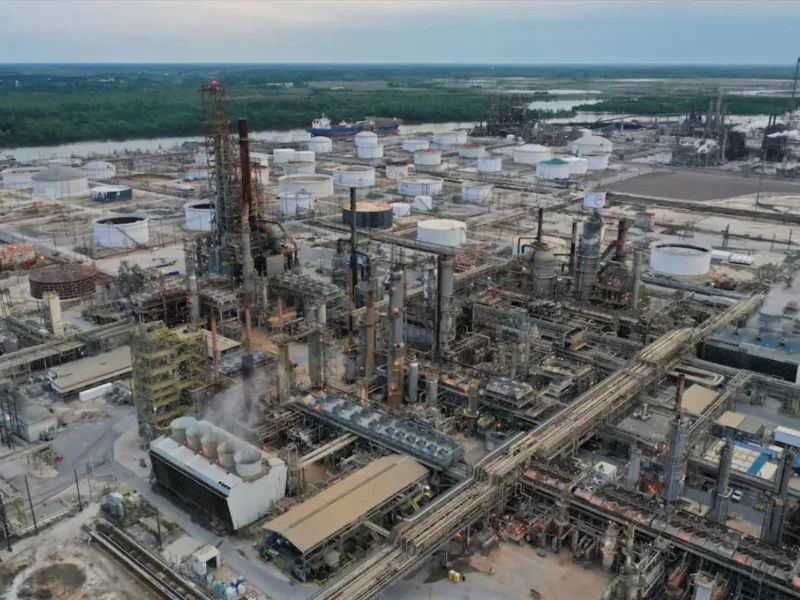Leaders Charting New Path On Urbanization And Climate Change
DUBAI, (IANS) – The COP28 Presidency on December 6 joined with the United Nations Human Settlements Program (UN-Habitat), the UN Climate Change High-Level Champion for COP28, and Bloomberg Philanthropies to call on housing, urban development, environment, and finance ministers to back the ‘Joint Outcome Statement on Urbanization and Climate Change.’
The statement, which was supported by over 40 Ministers of Environment, Urban Development, and Housing, was put forward at COP28 during the second Ministerial Meeting on Urbanization and Climate Change.
At the event, the COP28 Presidency UAE reiterated its appeal to national governments to fully integrate climate action among all levels of government and collaborate with sub-national governments on the design and implementation of new climate plans and policies, including the next round of NDCs ahead of COP30 in 2025.
The statement sets out a 10-point plan to boost the inclusion of cities in the decision-making process on climate change, drive multilevel climate action and accelerate the deployment of urban climate finance so that cities are prepared and supported to respond to the climate crisis.
Currently, 90 per cent of cities are threatened by rising sea levels and storms, and their residents are exposed to ten degrees higher temperatures than their counterparts in rural areas.
“COP28 is a paradigm shift to action. We are empowering and supporting cities on the frontlines of climate change to seize the initiative,” said Sultan Al Jaber, the COP28 President.
“We have brought over 450 mayors and governors to COP28, and their hyper-local knowledge is crucial in informing our global solutions. When we talk about inclusivity this is what we mean, we need all voices at the table. I thank and commend those involved for their leadership,” added Al Jaber.
“Each city has individual needs and solutions but fundamentally this is a global problem, which this Statement shows. We have bought over 1,000 mayors and governors to COP28 as, when we talk about full inclusivity this is what we mean. We know we can need to learn from and support those on the frontlines. I thank and commend those involved for their leadership,” added Al Jaber.
The Statement builds on the ‘Coalition for High Ambition Multilevel Partnerships’ (CHAMP), which was launched at the Local Climate Action Summit (LCAS) on December 1 at COP28 and aims to inform and empower ministers.
CHAMP aims to identify and strengthen levers to increase and accelerate the deployment of climate finance to enable cities and local governments to respond to the climate crisis.
It also aims to enable the inclusion of local and regional leaders in the formation of Nationally Determined Contributions (NDCs).
To date, CHAMP has been endorsed by over 60 national governments. Maimunah Mohd Sharif, Under-Secretary-General of the United Nations, and Executive Director of the United Nations Human Settlements Program (UN-Habitat), said, “The ministerial meeting was a key moment in our work toward inclusive and climate-resilient cities and communities. A diverse range of stakeholders gathered including leaders from the national and local level, underscoring the shared priority of supporting urban environments to withstand climate challenges.”
Though cities, which are home to most of the world’s population, contribute over 70 percent of CO2 emissions, immediate action could bring down their emissions to near net zero.






Pradeep Srivastava
/
Very interesting development. The following article from cop28.com provides additional details.
COP28 announces new partnerships and initiatives to advance sustainable urban development
Dubai, 6 December:
pradeep srivastava
You
Very interesting development. The following article from cop28.com provides additional details.
COP28 announces new partnerships and initiatives to advance sustainable urban development
Dubai, 6 December:
Over 40 ministers met today in Dubai in support of subnational climate action, joining the COP28 Presidency to announce a series of partnerships to accelerate the net-zero transition and climate resilience in cities.
The announcements span sectors including buildings, waste and resource management systems, urban water resilience, and urban nature restoration. They build on the 1 December launch of the Coalition for High Ambition Multilevel Partnerships for Climate Action (CHAMP) to include cities and regions in the design of federal climate commitments and strategies.
“Meeting the aims of the Paris Agreement and keeping 1.5°C within reach depends on the leadership and support of the world’s mayors and governors,” said Dr. Al Jaber, “That is why at COP28 we have empowered leaders and communities by launching CHAMP and working with organizations like UN-Habitat and Bloomberg Philanthropies to recognize and support the important roles cities and their leaders can play in addressing climate change.”
Multilevel Action, Urbanization, Built Environment and Transport Day hosted the second Urban Climate Ministerial, co-organized with United Nations Human Settlements Programme (UN-Habitat), and the UN Climate Change High-Level Champion for COP28,and concludes a week of unprecedented mayoral and gubernatorial participation in the COP process. Brazil’s Minister of Cities, HE Jader Barbalho Filho, closed the meeting by announcing Brazil’s plans to widen participation and mobilization for the Ministerial at COP30.
The COP28 Presidency and Bloomberg Philanthropies partnered to deliver the Local Climate Action Summit (LCAS) (1-2 December), which saw over 500 subnational leaders join the summit portion of a COP for the first time. Nearly USD $500 million of new city-focused climate investment was also announced.
6 December outcomes include:
The Buildings Breakthrough
The Buildings Breakthrough, launched with the support of 27 countries, is led by France and Morocco. The partnership aims to make ‘near-zero and resilient buildings’ the new normal by 2030, addressing the fact that the building sector alone accounts for nearly 40 percent of global energy-related CO2 emissions, 50 percent of extracted materials, and one-third of global waste.
The Cement Breakthrough
The Cement and Concrete Breakthrough was launched by Canada and the UAE, along with an inaugural cohort of endorsing countries that include the United Kingdom, Ireland, Japan and Germany. The initiative strives to make clean cement the preferred choice in global markets, with near-zero emission cement production established and growing in every region of the world by 2030.
The Waste to Zero initiative
Waste to Zero[1] is a voluntary coalition made up of governments of all levels, NGOs, and the private sector to decarbonize the waste management sector and transform waste into resources[2]. Waste to Zero is an official initiative under the UAE’s ‘Year of Sustainability’ and spearheaded by the UAE Ministry of Climate Change and Environment (MOCCAE), Abu Dhabi Waste Management Company (Tadweer), and Roland Berger.
The Waste MAP
The Waste MAP is the first-ever global platform to use satellite monitoring to track and measure methane emissions from waste, developed by the Global Methane Hub[3], Google Foundation, Rocky Mountain Institute, Clean Air Taskforce (CATF), the Netherlands Institute for Space Research (SRON)/GHGSat, and Carbon Mapper. Local governments and NGOs can use the platform to identify and mitigate methane emissions before they become hazardous. The platform is set to go live in 20 global megacities that are collectively home to over 100 million people.
Two new programmes to accelerate the adoption of 15-minute city (15MC)/proximity planning policies and measure their impact
C40, a network of nearly 100 mayors of the world’s leading cities, is increasing actions to accelerate the adoption of the 15-minute City (15MC) – highly liveable, walkable, and people-oriented cities. The Green and Thriving Neighborhoods programme created in collaboration with Urban Partners provides deep support to more than 40 cities to help them turn the 15MC into reality through the implementation of concrete pilot projects. C40 also launched a tool to measure the impacts of 15MC with Novo Nordisk. The Healthy Neighborhoods Explorer, created with Novo Nordisk’s Cities will enable policymakers to measure how 15MCs significantly reduce emissions and offer residents better health.
The Generation Restoration project
Guided by the Paris Agreement and the Global Biodiversity Framework, the Generation Restoration[4] project (2023-2025) is currently supporting pilot projects to catalyze urban ecosystem restoration and emissions mitigation in eight world cities[5]. These cities include Douala (Cameroon); Dakar-Plateau & Thies (Senegal); Quezon City (the Philippines); Kochi (India); Sirajganj (Bangladesh); Samborondon (Ecuador); Mexico City (Mexico); and Manaus (Brazil).
Commitments to fossil fuel-free land transport
World transport systems are vital for people’s lives and livelihoods, with transport representing around 22 percent of global carbon emissions.
The COP28 Presidency, the UAE Ministry of Energy and Infrastructure, the International Transport Forum, and the International Energy Agency have come together to organize the first ever transport-energy ministerial at a COP. Working closely with key delivery partners, including the SLOCAT Partnership, the Air Transport Action Group and the UN Climate Change High-Level Champions team, the COP28 Presidency spotlighted key solutions to decarbonize the transport sector.
The sustainable land transport community, led primarily by the SLOCAT Partnership, agreed to mark the first ever World Sustainable Transport Day on 26 November 2023, and issued a call to action to double the share of energy efficient and fossil-free forms of land transport by 2030. Initiated by SLOCAT and REN21 jointly with IDDRI, Institute for Transportation and Development Policy (ITDP), International Association of Railways (UIC), International Union of Railways (UITP) and World Resources Institute (WRI), and endorsed by Chile and Columbia and 60 multi stakeholder organizations.
‘A Playbook for Nature-Positive Infrastructure Development’
‘A Playbook for Nature-Positive Infrastructure Development’[6], in partnership with the World Wildlife Fund (WWF) and the International Federation of Consulting Engineers (FIDIC) spotlights the construction sector’s role in conserving and restoring natural ecosystems. The playbook draws from some of the world’s most important infrastructure projects, to offer practitioners a wide range of nature-based solutions that put nature at the heart of infrastructure design.
Forest & Climate Leaders’ Partnership’s (FCLP) Greening Construction with Sustainable Wood initiative
Together, the Buildings Breakthrough, Cement Breakthrough, and the FCLP’s Greening Construction with Sustainable Wood initiative, aim to unlock[7] intergovernmental and multi-level collaboration in response to the Global Stocktake. They offer national governments and other stakeholders a framework[8] to rapidly transform the building sector with greater mitigation, adaptation, and resilience.
My Personal Comment: Unless USA leads the world in addressing climate change, I don’t expect other countries to take the issue seriously. Considering the number of Republicans who are climate change deniers, I am not very optimistic right now. Also, Americans, in general, are short term thinkers. They say, “Who cares about the long term? In the long term, we will all be dead anyway” Furthermore, the developing countries and the underdeveloped countries will need some financial and technical assistance to implement the recommendations to address the climate change.
December 6, 2023